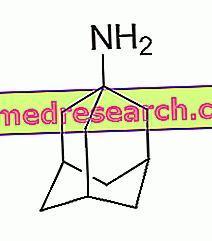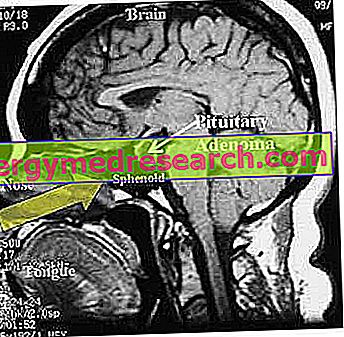Amantadine is an antiviral drug capable of inhibiting the early stages of virus replication. However, amantadine has also been shown to be effective in the treatment of Parkinson's disease, as it is able to exert a dopaminergic action (ie it is capable of increasing the signal of dopamine, a neurotransmitter lacking in patients suffering from this pathology ).

Amantadine - Chemical Structure
Although it is certainly not the drug of first choice for the treatment of Parkinson's disease, amantadine is used mainly for the treatment of the latter.
Indications
For what it uses
The use of amantadine is indicated for the treatment of:
- Parkinson's disease;
- Parkinsonism (extrapyramidal diseases that have similarities with Parkinson's disease);
- Bradypatichisms (slowness in the performance of all psychic processes) of the senile age, even on an arteriosclerotic basis, with or without extrapyramidal involvement.
From the point of view of antiviral activity, amantadine is effective against RNA viruses, in particular, against influenza viruses.
Warnings
Before starting treatment with amantadine and throughout its duration, patients must undergo electrocardiogram (ECG) to determine their cardiac function.
Patients suffering from cardiovascular diseases must be constantly monitored for the entire duration of amantadine treatment.
If you are also taking neuroleptic drugs together with amantadine, treatment with amantadine should not be stopped abruptly due to the possible onset of neuroleptic malignant syndrome.
A lot of caution should be used when administering amantadine in patients with kidney problems.
The intake of amantadine could favor the appearance of convulsions, especially in individuals who have suffered in the past.
Since there are insufficient data on the safe use of amantadine in pediatric patients, the use of the drug in children is not recommended.
Since amantadine reduces alcohol tolerance, the use of alcohol during drug therapy is contraindicated.
The use of amantadine may alter the ability to drive and / or use machinery, so care should be taken.
Interactions
During treatment with amantadine, you should not take other drugs that have the ability to alter the electrocardiogram. Among these drugs, we recall:
- Antiarrhythmic drugs;
- Some antipsychotic drugs, such as, for example, chlorpromazine, haloperidol, ziprasidone or pimozide;
- Some types of tricyclic antidepressants, such as, for example, amitriptyline;
- Some antihistamines, such as astemizolo;
- Some types of antibiotics, such as erythromycin, clarithromycin and sparfloxacin;
- Azole antifungals ;
- Budipin, another drug used in the treatment of Parkinson's disease;
- Alofantrine, an antimalarial drug;
- Cotrimoxazole and pentamidine, antibacterial drugs;
- Bepridil, a drug used to treat angina pectoris.
Concomitant intake of amantadine and anticholinergic drugs can cause an increase in the side effects induced by the latter.
When administered concomitantly with amantadine, memantine (a drug used in the treatment of Alzheimer's disease) may increase the activity and, consequently, the side effects of the amantadine itself.
Concomitant use of diuretics and amantadine should be avoided, as diuretics reduce the elimination of amantadine from the body with the possible risk of reaching toxic blood concentrations.
In any case, it is always a good idea to inform your doctor if you are taking - or have recently been - any type of medication, including non-prescription medicines and herbal and / or homeopathic products.
Side effects
Amantadine can cause various types of side effects, although not all patients experience them. This depends on the different sensitivity that each individual has towards the drug. Therefore, it is said that the undesirable effects do not all occur with the same intensity in each patient.
The main side effects that may occur during the amantadine treatment are listed below.
Cardiovascular disorders
Amantadine therapy can cause:
- Orthostatic hypotension;
- Cardiac arrhythmias;
- Ventricular fibrillation;
- Electrocardiogram changes.
Pathologies of the central nervous system
Treatment with amantadine can cause headaches, dizziness, peripheral neuropathy, myoclonia and seizures (the latter can occur especially if overdose is taken).
Psychiatric disorders
Amantadine-based therapy can promote sleep disorders, psychomotor restlessness, paranoid behavior and hallucinations.
Gastrointestinal disorders
Treatment with amantadine may cause nausea, vomiting, diarrhea and stomach pains.
Blood and lymphatic system disorders
Amantadine therapy can lead to the onset of leukopenia and thrombocytopenia (respectively, decreased blood levels of leukocytes and platelets).
Eye disorders
Treatment with amantadine can lead to blurred vision, photosensitivity and temporary loss of vision.
Other side effects
Other side effects that may occur during amantadine therapy are:
- Loss of appetite;
- Anorexia;
- Dry mouth;
- Urinary retention in the presence of prostatic hypertrophy;
- Leticular reticularis, a pathology of the skin characterized by the onset of spots that have a network conformation.
Overdose
If excessive amounts of amantadine are taken, symptoms such as:
- Nausea;
- He retched;
- Tremors;
- Dysarthria;
- hyperexcitability;
- Ataxia;
- Lethargy;
- Blurred vision;
- Depression;
- Brain convulsions;
- Cardiac rhythm disorders.
In addition, when excessive doses of amantadine are taken together with other anti-Parkinson drugs, acute toxic psychoses, confusional states, hallucinations, myoclonus and coma may occur.
In case of overdose with amantadine there is no real antidote. Induction of vomiting or gastric lavage may be useful to eliminate excess drug from the body.
In any case, if amantadine overdosage is suspected, it is necessary to contact the doctor immediately and contact the nearest hospital.
Action mechanism
As mentioned above, amantadine is an antiviral drug, but it has also proved very useful for the treatment of Parkinson's disease.
Amantadine performs its antiviral action by inhibiting one of the first stages of virus replication. More in detail, the amantadine inhibits the penetration of the RNA of the virus into the host cell, by doing so, the virus is no longer able to replicate.
As for Parkinson's disease, on the other hand, amantadine is effective in the treatment of this disease thanks to its ability to increase the dopamine signal, one of the neurotransmitters present in the body.
In fact, Parkinson's disease is characterized by a degeneration of dopaminergic neurons (ie neurons that communicate using dopamine as a neurotransmitter) at the level of certain brain areas called nigrostriatal areas.
Amantadine is able to increase the synthesis and release of dopamine, thus favoring an improvement in the patient's symptoms.
Mode of Use - Posology
Amantadine is available for oral administration as tablets.
The dose of amantadine that must be taken and the duration of the treatment must be established by the doctor according to the type of pathology to be treated, depending on the patient's response to therapy and according to his health conditions.
Generally, the dose of amantadine usually used for the treatment of Parkinson's disease, parkinsonism and age-related bradipsichismi, is 200 mg of drug to be taken in two divided doses.
Elderly patients and patients with reduced kidney function may need to adjust their usual amantadine dose.
Pregnancy and breastfeeding
Some animal studies have shown that amantadine can be toxic to the fetus, however, there is no certainty about the potential risk to humans. For this reason, the use of the drug by pregnant women should only be carried out if the doctor considers it absolutely necessary.
Amantadine is excreted in breast milk. If the drug therapy is absolutely necessary for the mother, the newborn must be kept under strict surveillance to detect the occurrence of possible side effects, such as skin rashes, vomiting and urinary retention.
Contraindications
The use of amantadine is contraindicated in the following cases:
- In patients with hypersensitivity known to amantadine itself;
- In patients who suffer - or who have suffered - from serious heart conditions;
- In patients already on budipine therapy or with other drugs capable of causing a prolongation of the QT interval (the interval of time necessary for the ventricular myocardium to depolarize and repolarize);
- In patients who have low blood levels of magnesium and potassium;
- In pediatric patients.



